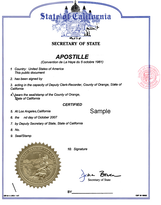Understanding the Apostille Process: A Comprehensive Guide to International Record Authentication
Browsing the detailed landscape of international paper verification can be daunting without a clear understanding of the apostille process. This guide diligently outlines the required steps, from determining which records require accreditation to sending them for confirmation by the Competent Authority. Realizing the importance of an apostille and acknowledging prospective risks, such as insufficient entries and language obstacles, can significantly improve the authentication journey. What exactly defines an apostille, and why is it so vital for records predestined for Hague Convention nations? These inquiries develop the structure of our expedition into this essential lawful treatment.
What Is an Apostille?
An apostille is a main qualification that validates the credibility of a paper for use in one more country. This qualification, released by a marked authority in the country where the file originated, ensures that the record is identified as legitimate and genuine in the international arena. The procedure of acquiring an apostille involves several actions, including the verification of the record's trademarks, seals, and stamps by suitable governmental bodies.
The apostille acts as a worldwide acknowledged form of verification, implemented by the Hague Convention of 1961. This treaty, officially called the Hague Convention Eliminating the Requirement of Legalisation for Foreign Public Records, standardizes the process of paper certification amongst member countries. The apostille itself is a standard certificate that has certain information, such as the releasing authority, the native land, and the date of issuance.
It is very important to note that not all documents are eligible for an apostille. Typically, public papers like copyright, marriage licenses, court orders, and instructional diplomas receive this qualification. Personal records, such as contracts and arrangements, may need registration and extra actions to qualify.
Value of Apostille
Understanding what an apostille is sets the phase for appreciating its relevance in global transactions. houston tx apostille. An apostille, basically a form of qualification issued by a marked authority, confirms the authenticity of a record for use in international nations that are signatories to the Hague Apostille Convention. This standard procedure eliminates the requirement for additional legalisation by embassies or consulates, consequently streamlining worldwide deals
It guarantees the trustworthiness and approval of necessary papers-- such as birth certifications, marital relationship licenses, and academic diplomas-- across borders. For companies, it helps with the smooth conduct of international trade, mergings, and procurements by giving a relied on technique of file verification.
Additionally, an apostille enhances lawful safety and conformity. Federal governments and institutions can confidently rely on the credibility of records birthing an apostille, minimizing the threat of fraudulence and misrepresentation.
Papers That Call For Apostille
When click site taking part in global deals or legal issues, certain documents usually necessitate the authentication provided site here by an apostille. This ensures their recognition and acceptance in nations that are signatures to the Hague Apostille Convention. Frequently, personal papers such as birth certifications, marital relationship certifications, and fatality certificates need an apostille, especially when they are used for processes like migration, marital relationship abroad, or international probate matters.
Educational files are one more group frequently calling for apostilles. Diplomas, transcripts, and scholastic records usually need this authentication for objectives such as pursuing more education and learning, work, or specialist licensing in an international nation (houston tx apostille). This step ensures that the papers are identified as legitimate and valid
Legal documents, consisting of powers of attorney, affidavits, and court orders, also typically require apostilles. Company documents such as certifications of unification, bylaws, and industrial contracts may require an apostille to promote international profession, develop international branches, or involve in cross-border legal proceedings.
Steps to Obtain an Apostille

Acquiring an apostille involves a multi-step process that makes certain the authenticity and approval of your documents in international nations. The initial action is identifying which papers require an apostille. houston tx apostille. Typical papers consist of birth certifications, marriage licenses, scholastic transcripts, and corporate files
Once identified, the record needs to be licensed by the ideal issuing authority. This might involve notarization by a notary public or confirmation by a neighborhood or state official, depending on the sort of file. After certification, the paper must be submitted to the marked Competent Authority in the paper's country of beginning. In the USA, for example, this is usually the Secretary of State's workplace for every state.
The entry process generally needs a finished application, the initial file, and a cost. Some jurisdictions might offer the alternative of expedited processing for an extra cost. Upon successful confirmation, the Competent Authority will attach the apostille certification to the file, therefore confirming its authenticity.
Usual Challenges and Solutions
Browsing the apostille procedure can present a number of usual challenges that, otherwise properly dealt with, might postpone or complicate file verification. One constant issue is the entry of wrong or incomplete files. Each nation has specific requirements for the kinds of records that can be apostilled, and any discrepancy from these can lead to denial. Guaranteeing company website that all files are precise and full prior to entry is crucial.
Another typical challenge is comprehending the diverse handling times. Handling times can vary dramatically in between nations and also between different regions within the same nation. It is essential to account for these variants when intending the apostille procedure to prevent unforeseen hold-ups.
Furthermore, language barriers can position significant barriers. Records in an international language commonly need certified translations, and any errors in translation can cause additional problems. Involving a specialist translation service can reduce this risk.

Verdict
Grasping the apostille process significantly boosts the effectiveness of worldwide document verification. By comprehending the necessity of recognizing and accrediting required records, and browsing the submission to the Competent Authority, the procedure ends up being more convenient. Understanding of usual difficulties, such as incomplete entries and language barriers, better aids in preventing possible delays. Making certain files are properly apostilled facilitates their approval in Hague Convention signatory countries, therefore supporting smooth worldwide lawful and administrative treatments.